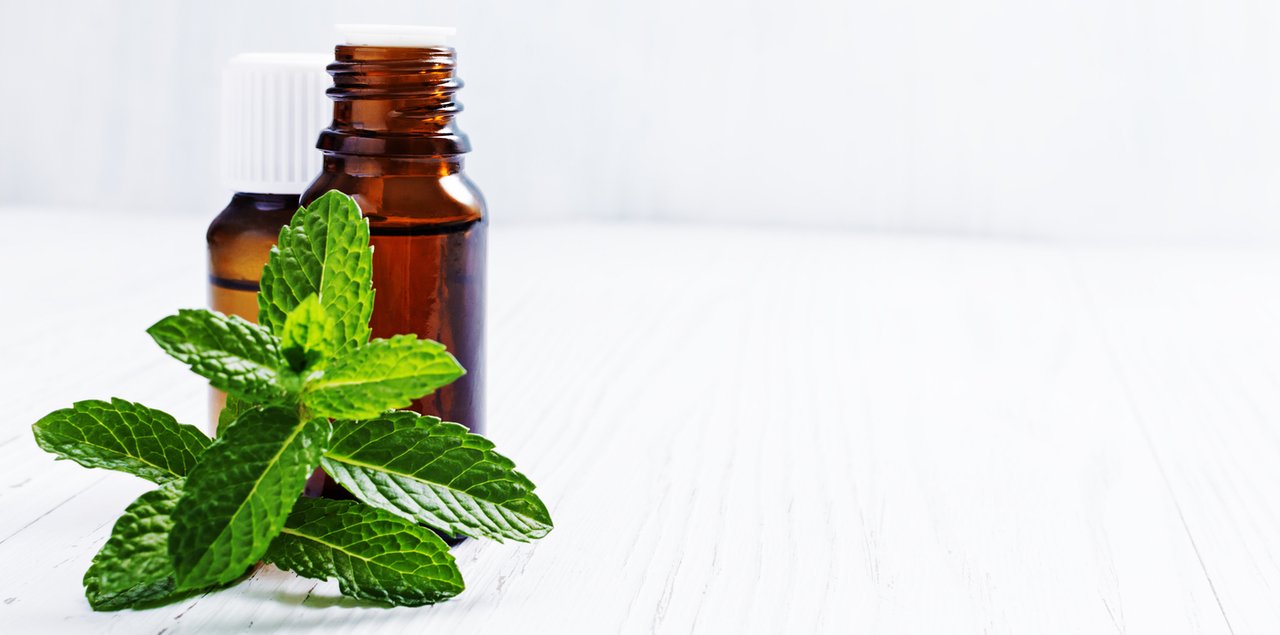Listen on: Apple Podcasts | Spotify
Peppermint essential oil. From Peppermint Patties to muscle rubs, and cigarettes to the gum you chew to get rid of the nasty breath, peppermint oil is ubiquitous in food, drink, and personal care and household products.
Of course, peppermint flavor isn’t the same as therapeutic peppermint essential oil, though people often talk about it as the same thing.
Peppermint essential oil offers numerous health and fitness benefits. It’s been used for thousands of years in Egypt, Greece, and Rome. It showed up in medical references beginning in 1753.
So, what exactly is peppermint essential oil? What are the health and fitness benefits? How do you use it?
What is peppermint essential oil?
The peppermint plant (Mentha piperita) is a natural hybrid of spearmint and water mint.
The essential oil, steam distilled from the leaves, contains more than 40 key constituents, or chemical compounds. Menthone, methyl acetate, and menthol are the most abundant in peppermint essential oil.
Peppermint originally came from the Middle East and Europe, but is grown throughout the world today.
You’ll find it in chewing gum, candy, ice cream, alcohol, toothpaste, muscle rubs and pain creams, air fresheners, and even some cigarettes.
Health and Fitness Benefits of Peppermint Essential Oil
With the numerous constituents found in the oil, it provides a wide variety of health-promoting benefits, from digestive health to athletic performance.
Enhances Exercise and Athletic Performance
Peppermint stimulates your nervous system. It’s not like the jacked-up energy rush from a dose of ephedrine, with an equally extreme crash afterwards. It’s more of a boost in focus and mental acuity, with enough of an invigorating effect to improve physical performance.*
Since it stimulates the nervous system, you’d expect it to increase heart rate. However, over time, it may actually lower resting and exercising heart rate.
In one study, participants were given one drop of peppermint essential oil (50 µl) on the tongue. Grip strength, vertical jump, standing long jump, visual and auditory reaction time, and heart rate variability all improved five minutes after the peppermint was ingested. In fact, all measures were still significantly improved one hour later.
The fact that visual and auditory reaction time improved makes peppermint a potential ergogenic aid for sports that require quick reflexes. If I played baseball, soccer, or football, for example, I’d definitely use it during competition.
In a study published in the Journal of the International Society of Sports Nutrition, participants drank one 500 ml bottle of peppermint oil-infused mineral water each day for 10 days. The mineral water contained 0.05 ml peppermint, which is the equivalent of one drop.
After 10 days, lung capacity and blood lactate levels during exercise improved. Carbohydrate metabolism also increased, which suggested their muscle tissue produced more energy. Their heart rate during exercise, and at rest, also dropped.
Another study looked at the effects of using peppermint essential oil on the results of a treadmill stress test. Workload improved, and markers of mental stress decreased.
Still one more worth mentioning, showed that inhalation of peppermint led to a decreased quarter-mile run time, and increased push-up and grip strength performance.
One final way peppermint may enhance performance is by cooling the body, especially in hot weather. As I discussed in my article on delayed onset muscle soreness, menthol has a cooling effect when used topically or internally.
I use peppermint, or a blend of essential oils that includes peppermint, prior to my workouts. Not only is it invigorating, it smells good too.
Reduces Occasional Pain and Soreness
As I mentioned, peppermint essential oil has a high concentration of menthol. Menthol is a well-known topical analgesic, and key compound in muscle and pain rubs for delayed onset muscle soreness or occasional joint pain.
The cooling effect, and pain-reducing effects of menthol come from the same thing. It blocks calcium channels. That probably doesn’t mean a whole lot. I only mention it because that weird, cooling effect you feel is also the same thing that helps make muscle aches go away.
Supports Digestive Health
Peppermint essential oil relaxes smooth muscle, and since most of the digestive system is made of smooth muscle, has been shown to relieve occasional digestive discomfort.
People with disorders in the upper digestive tract often experience symptoms like chest pain and dysphagia, or a feeling that food is stuck in their throats.
To test the effects of peppermint essential oil, researchers gave peppermint Altoids® to patients with these symptoms. Altoids® have an 11% concentration of peppermint essential oil. The majority of patients experienced fewer or reduced symptoms.
Peppermint essential oils may reduce ocassionional digestive discomfort or pain, but it is not effective for constipation. Magnesium is much better for constipation.
As I searched through Pubmed about peppermint, I came across dozens of articles and publications discussing the use of peppermint for irritable bowel syndrome (IBS). Those with IBS are often left with a fear of eating anything, knowing that when they do, they’ll encounter stomach pain, cramps, and gas.
In a small study, patients who took peppermint essential oil in a capsule, three times per day had more symptom-free days than those not using peppermint.
While that’s great for some temporary relief, if you do have IBS, please take a serious look at your diet and make some changes.
Peppermint essential oil relaxes smooth muscle, including that of the esophagus. Those with acid reflux should introduce the use of peppermint slowly if ingesting it, to see if it increases the occurrence of symptoms.
Though it isn’t necessarily related to digestive function, peppermint essential oil has been shown to reduce feelings of nausea, especially following surgery.
Animal research shows peppermint supports normal levels of inflammation throughout the digestive system.
Alleviating Symptoms Vs. Treating Disease
Though peppermint essential oil has been shown to help alleviate pain and other symptoms related to irritable bowel syndrome, I need to stress this point (which is why I’m including it in a call-out box).
Peppermint essential oil does not treat irritable bowel syndrome.
It simply helps manage symptoms. If you have irritable bowel (which 5-15% of the population does), you must change your diet so you can repair your damaged digestive system.
You might need to stop consuming dairy. You should absolutely stop eating gluten. And you need to avoid other triggers that set off IBS symptoms such as FODMAPS.
I need to stress this point because I’ve seen too many people drawn to essential oils, supplements, or “functional foods” to “treat” a disease. In most cases, a disease or dysfunction can only be treated with diet, lifestyle, and exercise choices that stop doing the damage that caused the dysfunction in the first place. In some cases, they also require medication.
If your first choice when dealing with a disease or treating a condition is to start taking a supplement, you’re doing it wrong.
Relieves Tension Headaches
Tension headaches are the most common form of headache in adults. As the name suggests, muscle tension causes them.
Since menthol is a muscle relaxer, and a key constituent in peppermint, it’s no surprise that research shows it significantly reduces the severity of tension headaches.
Like its effects on digestive health, it’s important to keep in mind that peppermint does not fix the cause of tension headaches. It simply alleviates the symptom. It relaxes the muscles creating the tension.
To reduce or eliminate tension headaches, you may need to improve your posture, develop better muscle strength and balance in your upper back and neck, or invest time in better stress management strategies.
Supports Hair Growth
Research on animals shows that peppermint essential oil may be a natural and effective option for male pattern baldness, also known as androgenetic alopecia.
That’s part of the reason you find so many shampoos and conditioners infused with peppermint oil.
Male pattern baldness is more common in guys with higher testosterone levels, so the baldness is usually worth the tradeoff. Better to have some balding and higher testosterone than a full head of hair with low testosterone.
Read more: Low Testosterone: What You Need To Know.
Enhances Cognitive Function
Peppermint essential oil seems to improve memory and visual attention. It also improves alertness and reduces fatigue when driving, which could be helpful for truck drivers or for those on a long-road trip.
Those benefits might also be helpful for students pulling an all-nighter.
It may also support normal mood and emotions. In a study measuring salivary cortisol levels, the main marker of “stress,” the inhalation of peppermint lowered cortisol. Interestingly, inhaling lavender did not lower cortisol, even though lavender enhances sleep quality.
Though peppermint is stimulating, it may actually help you get into deep sleep.
In a small study, participants staying in a sleep ward received peppermint water about 9:00 pm. Compared to their baseline, women in the group experienced higher levels of non-rapid eye movement (deep) sleep, though they did not experience increased alertness when using it. Men, on the other hand, did not experience changes in sleep, but did find the immediate effect of peppermint to be arousing (like, they had more energy…not the other sort of arousal). On another night, participants received lavender, which enhanced REM sleep in women, but not in men.
Cools the Body
Peppermint may be helpful when exercising or working in the heat, as it helps cool the body. I also recommend it when using a sauna, especially for those who have a hard time with the heat. It may help you last in the sauna long enough to sweat and experience the detox benefits of the sauna.
Of course, peppermint essential oil smells fantastic. The smell itself may be invigorating or improve mood.
In my personal experiences, peppermint is consistently listed among the favorites for regular essential oil users.
Frequently Asked Questions (FAQs)
More than likely, you’re already ingesting peppermint essential oil in candy, chewing gum, or other desserts. You can also use therapeutic quality peppermint essential oil in your water bottle or for cooking. Just be conservative about how much you use. A little goes a long way.
You can dilute peppermint oil with any carrier oil, such as coconut oil or medium-chain triglyceride (MCT) oil.
Peppermint essential oil is cooling to the skin. A small percentage of people may experience temporary reddening in the area it’s applied. A small percentage may experience a contact reaction. Diluting the oil will minimize the effects on the skin, though the dilution also reduces the intensity of peppermint’s effects.
Since it’s considered a “hot” oil, if you get it in your eye, it burns. It won’t damage the eye, but it can be painful. The best way to dull the burning sensation is to add an a little vegetable oil to your eye. This helps dilute the essential oil. Water, on the other hand, would make it worse.
Read also: Essential Oils For Fitness: Research, Anecdotal Evidence, Experimentation.



